By Kenneth D. Johnson · Monday, March 19, 2018 Telos 182 (Spring 2018), a special issue commemorating the life and thought of Martin Luther King, Jr., is now available for purchase in our store.
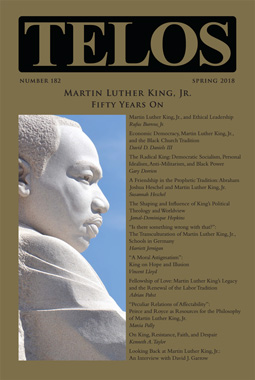 1968 was a tough year for the United States and for many around the world. The Tet Offensive in Vietnam started in January, and the My Lai massacre occurred there in March. In Paris, the student uprising started in May. The Prague Spring, during which Czechoslovakian activists sought a measure of greater freedom for their country from the Soviet Union, was crushed by Warsaw Pact military forces in August. Police rioted at the Democratic National Convention in Chicago in August, beating student protestors indiscriminately in the streets. The Weather Underground emerged in October, and black American sprinters Tommie Smith and John Carlos gave their gloved Black Power salute as a protest during the Mexico City Olympics that same month. Richard M. Nixon was elected as president in November. And, there were two pivotal deaths: Robert F. Kennedy in June, and Reverend King in April. After King’s assassination, many U.S. cities erupted in flames as their African American residents protested his killing and the moribund state of civil rights progress at the time of King’s death. 1968 was a tough year for the United States and for many around the world. The Tet Offensive in Vietnam started in January, and the My Lai massacre occurred there in March. In Paris, the student uprising started in May. The Prague Spring, during which Czechoslovakian activists sought a measure of greater freedom for their country from the Soviet Union, was crushed by Warsaw Pact military forces in August. Police rioted at the Democratic National Convention in Chicago in August, beating student protestors indiscriminately in the streets. The Weather Underground emerged in October, and black American sprinters Tommie Smith and John Carlos gave their gloved Black Power salute as a protest during the Mexico City Olympics that same month. Richard M. Nixon was elected as president in November. And, there were two pivotal deaths: Robert F. Kennedy in June, and Reverend King in April. After King’s assassination, many U.S. cities erupted in flames as their African American residents protested his killing and the moribund state of civil rights progress at the time of King’s death.
Continue reading →
By Russell A. Berman · Wednesday, December 13, 2017 Telos 181 (Winter 2017): War and Civil War is now available for purchase in our store.
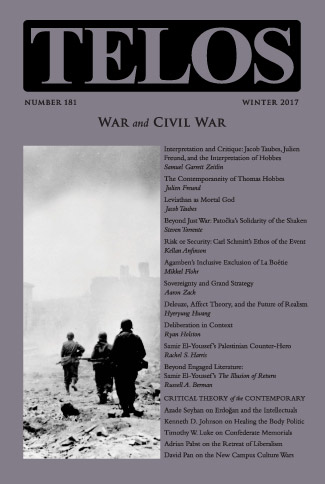 Consider the question: has American political life ever been as polarized as it is today? If the most appropriate answer is: yes, of course, in 1861, then the problem has been named and we are left with little comfort. The evaporation of anything like a bipartisan consensus in the political class leaves us staring at a battlefield, with few common bonds or shared attachments. Politics has become the internalization of war by other means. This is our version of the crisis of parliamentary democracy that Schmitt described in the Weimar years. Congressional Democrats are unwilling to cross the aisle to find room for compromise in the Trump era, but this only repeats the animosity among Republicans toward the Obama agenda eight years ago. Each party seeks its own advantage, which exclusively means the other party’s disadvantage, as the national good slips beneath the horizon. Each party focuses on mobilizing its base for votes and fund-raising, which means that each has an irresistible incentive to avoid solving those problems that are the most effective vehicles for rallying their supporters: when they held the majority, the Democrats preferred to keep the “dreamers” vulnerable, so as to be able to recycle them in future campaigns, just as the Republicans chose to punt on health care. Each issue is too successful in attracting voters, too valuable to give up. Consider the question: has American political life ever been as polarized as it is today? If the most appropriate answer is: yes, of course, in 1861, then the problem has been named and we are left with little comfort. The evaporation of anything like a bipartisan consensus in the political class leaves us staring at a battlefield, with few common bonds or shared attachments. Politics has become the internalization of war by other means. This is our version of the crisis of parliamentary democracy that Schmitt described in the Weimar years. Congressional Democrats are unwilling to cross the aisle to find room for compromise in the Trump era, but this only repeats the animosity among Republicans toward the Obama agenda eight years ago. Each party seeks its own advantage, which exclusively means the other party’s disadvantage, as the national good slips beneath the horizon. Each party focuses on mobilizing its base for votes and fund-raising, which means that each has an irresistible incentive to avoid solving those problems that are the most effective vehicles for rallying their supporters: when they held the majority, the Democrats preferred to keep the “dreamers” vulnerable, so as to be able to recycle them in future campaigns, just as the Republicans chose to punt on health care. Each issue is too successful in attracting voters, too valuable to give up.
Continue reading →
By Ning Wang · Wednesday, September 13, 2017 Telos 180 (Fall 2017) is now available for purchase in our store.
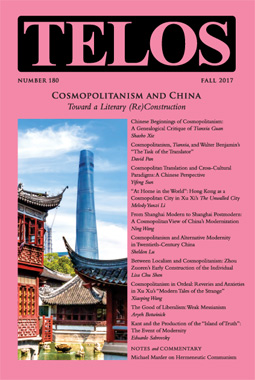 In Western as well as international academia today, along with the acceleration of globalization more generally, humanities scholars have constructed a sort of theoretical discourse of globalization. In doing so, they have found it useful to refer to the old-fashioned philosophical concept of cosmopolitanism, which is very close to the theoretical construction of the discourse of globalization. Although it has previously been discussed over the history of Western philosophy, cosmopolitanism is once again a cutting-edge theoretical topic. The term nowadays frequently appears in the works of political philosophers and sociologists, and it is increasingly being taken up and debated by literary and cultural studies scholars as well, particularly with regard to the rise of world literature as the highest phase of comparative literature. Obviously, most of their work interprets and deals with cosmopolitanism from the perspectives of political philosophy and culture, while touching to some degree upon literary and cultural production and criticism. Moreover, most of the scholarship dealing with cosmopolitanism only occurs within a Western context. In this respect, the present special issue of Telos may well fill a gap in international cosmopolitanism scholarship. The recent interest in world literature in the field of comparative literature is undoubtedly associated with the rise of cosmopolitanism in the contemporary era. In the articles collected here, cosmopolitanism will mainly be addressed from literary and cultural perspectives, and, more importantly, they will move beyond the limits of Eurocentric or West-centric ways of thinking and modes of research by dealing exclusively with cosmopolitanism and China: its parallel relations with ancient Chinese philosophy, its impact on modern Chinese literature and intellectual thought, and its recent significance to China’s modernization and globalization. In Western as well as international academia today, along with the acceleration of globalization more generally, humanities scholars have constructed a sort of theoretical discourse of globalization. In doing so, they have found it useful to refer to the old-fashioned philosophical concept of cosmopolitanism, which is very close to the theoretical construction of the discourse of globalization. Although it has previously been discussed over the history of Western philosophy, cosmopolitanism is once again a cutting-edge theoretical topic. The term nowadays frequently appears in the works of political philosophers and sociologists, and it is increasingly being taken up and debated by literary and cultural studies scholars as well, particularly with regard to the rise of world literature as the highest phase of comparative literature. Obviously, most of their work interprets and deals with cosmopolitanism from the perspectives of political philosophy and culture, while touching to some degree upon literary and cultural production and criticism. Moreover, most of the scholarship dealing with cosmopolitanism only occurs within a Western context. In this respect, the present special issue of Telos may well fill a gap in international cosmopolitanism scholarship. The recent interest in world literature in the field of comparative literature is undoubtedly associated with the rise of cosmopolitanism in the contemporary era. In the articles collected here, cosmopolitanism will mainly be addressed from literary and cultural perspectives, and, more importantly, they will move beyond the limits of Eurocentric or West-centric ways of thinking and modes of research by dealing exclusively with cosmopolitanism and China: its parallel relations with ancient Chinese philosophy, its impact on modern Chinese literature and intellectual thought, and its recent significance to China’s modernization and globalization.
Continue reading →
By Russell A. Berman · Monday, June 12, 2017 Telos 179 (Summer 2017) is now available for purchase in our store.
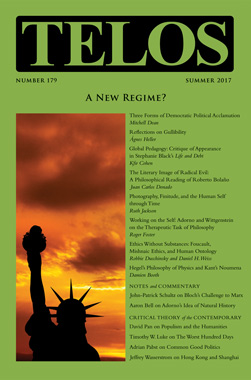 When the historian Ken Burns spoke at the Stanford University commencement last June, he delivered an exceptionally political address, including an attack on what he labeled the “Vichy Republicans.” Those Republican leaders who had not distanced themselves from candidate Trump, so Burns, were the equivalent of the Vichy French who collaborated with Hitler. That master metaphor, comparing 2016 to 1933, has continued into the new administration, with the anti-Trump camp labeling itself as “the resistance.” Despite Burns’s historiographical authority, one might question the validity of the underlying equation. No doubt the policies of the Trump administration are more conservative than those of Obama—hardly surprising—but the paradigms of the totalitarianism of the twentieth century are not necessarily the most adequate theoretical tools to analyze early twenty-first-century political phenomena. As emotionally satisfying as it may be for some to try to relive battles of earlier decades, Critical Theory ought to try to do better. We may very well be entering a different political era, a new regime, and not only in the United States. Can we describe it more effectively? When the historian Ken Burns spoke at the Stanford University commencement last June, he delivered an exceptionally political address, including an attack on what he labeled the “Vichy Republicans.” Those Republican leaders who had not distanced themselves from candidate Trump, so Burns, were the equivalent of the Vichy French who collaborated with Hitler. That master metaphor, comparing 2016 to 1933, has continued into the new administration, with the anti-Trump camp labeling itself as “the resistance.” Despite Burns’s historiographical authority, one might question the validity of the underlying equation. No doubt the policies of the Trump administration are more conservative than those of Obama—hardly surprising—but the paradigms of the totalitarianism of the twentieth century are not necessarily the most adequate theoretical tools to analyze early twenty-first-century political phenomena. As emotionally satisfying as it may be for some to try to relive battles of earlier decades, Critical Theory ought to try to do better. We may very well be entering a different political era, a new regime, and not only in the United States. Can we describe it more effectively?
Continue reading →
Telos 178 (Spring 2017) is now available for purchase in our store.
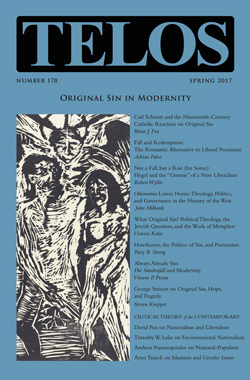 “If men were angels, no government would be necessary,” James Madison famously writes in Federalist No. 51. The defectiveness of the human will and the human intellect make government necessary, whether in John Calvin’s Sermon on the Galatians, which Madison echoes, in the locus classicus of this argument, Augustine’s City of God, or in book 9 of Plato’s Laws, which already describes humans’ innate capacity for evil as “a result of crimes long ago.” In modernity, Christian tropes like the Fall and original sin are used not only to justify political power, but also to temper utopian political goals. Reinhold Niebuhr emphasized the latter, for example, when he described the preference of the United States’ purportedly “Calvinist fathers” for relying upon checks and balances rather than the intelligence and goodwill of future American statesmen. Even the most familiar political analyses of original sin and the anthropology of Western Christianity contain this tension between justifying and limiting political power. “If men were angels, no government would be necessary,” James Madison famously writes in Federalist No. 51. The defectiveness of the human will and the human intellect make government necessary, whether in John Calvin’s Sermon on the Galatians, which Madison echoes, in the locus classicus of this argument, Augustine’s City of God, or in book 9 of Plato’s Laws, which already describes humans’ innate capacity for evil as “a result of crimes long ago.” In modernity, Christian tropes like the Fall and original sin are used not only to justify political power, but also to temper utopian political goals. Reinhold Niebuhr emphasized the latter, for example, when he described the preference of the United States’ purportedly “Calvinist fathers” for relying upon checks and balances rather than the intelligence and goodwill of future American statesmen. Even the most familiar political analyses of original sin and the anthropology of Western Christianity contain this tension between justifying and limiting political power.
Continue reading →
By Jon Wittrock and Richard Polt · Monday, December 12, 2016 Telos 177 (Winter 2016) is now available for purchase in our store.
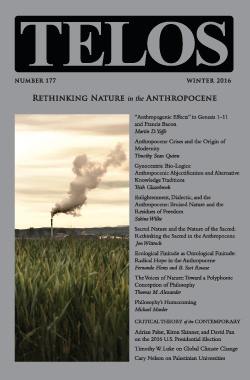 While the term Anthropocene was used in the USSR already in the 1960s to refer to the late Quaternary era, it rose to prominence more recently when introduced by Eugene F. Stoermer and Paul J. Crutzen. As the very word indicates, this is an epoch when humanity has taken center stage in the sense that its activities now have a major, global, and lethal impact. The shadow of human-caused global destruction and mass death haunts this epoch, and indeed, humanity’s newly acquired capacity for devastation is one of the Anthropocene’s most marked traits. While mass extinctions are hardly new phenomena and while the specter of the extinction of humanity due to some sudden catastrophe was there even before human beings were aware of it in scientific terms, the actual capacity of humanity to extinguish itself along with a large swath of other species on the planet is new, and the stakes of human action are higher. While the term Anthropocene was used in the USSR already in the 1960s to refer to the late Quaternary era, it rose to prominence more recently when introduced by Eugene F. Stoermer and Paul J. Crutzen. As the very word indicates, this is an epoch when humanity has taken center stage in the sense that its activities now have a major, global, and lethal impact. The shadow of human-caused global destruction and mass death haunts this epoch, and indeed, humanity’s newly acquired capacity for devastation is one of the Anthropocene’s most marked traits. While mass extinctions are hardly new phenomena and while the specter of the extinction of humanity due to some sudden catastrophe was there even before human beings were aware of it in scientific terms, the actual capacity of humanity to extinguish itself along with a large swath of other species on the planet is new, and the stakes of human action are higher.
Continue reading →
|
|
 1968 was a tough year for the United States and for many around the world. The Tet Offensive in Vietnam started in January, and the My Lai massacre occurred there in March. In Paris, the student uprising started in May. The Prague Spring, during which Czechoslovakian activists sought a measure of greater freedom for their country from the Soviet Union, was crushed by Warsaw Pact military forces in August. Police rioted at the Democratic National Convention in Chicago in August, beating student protestors indiscriminately in the streets. The Weather Underground emerged in October, and black American sprinters Tommie Smith and John Carlos gave their gloved Black Power salute as a protest during the Mexico City Olympics that same month. Richard M. Nixon was elected as president in November. And, there were two pivotal deaths: Robert F. Kennedy in June, and Reverend King in April. After King’s assassination, many U.S. cities erupted in flames as their African American residents protested his killing and the moribund state of civil rights progress at the time of King’s death.
1968 was a tough year for the United States and for many around the world. The Tet Offensive in Vietnam started in January, and the My Lai massacre occurred there in March. In Paris, the student uprising started in May. The Prague Spring, during which Czechoslovakian activists sought a measure of greater freedom for their country from the Soviet Union, was crushed by Warsaw Pact military forces in August. Police rioted at the Democratic National Convention in Chicago in August, beating student protestors indiscriminately in the streets. The Weather Underground emerged in October, and black American sprinters Tommie Smith and John Carlos gave their gloved Black Power salute as a protest during the Mexico City Olympics that same month. Richard M. Nixon was elected as president in November. And, there were two pivotal deaths: Robert F. Kennedy in June, and Reverend King in April. After King’s assassination, many U.S. cities erupted in flames as their African American residents protested his killing and the moribund state of civil rights progress at the time of King’s death. 






